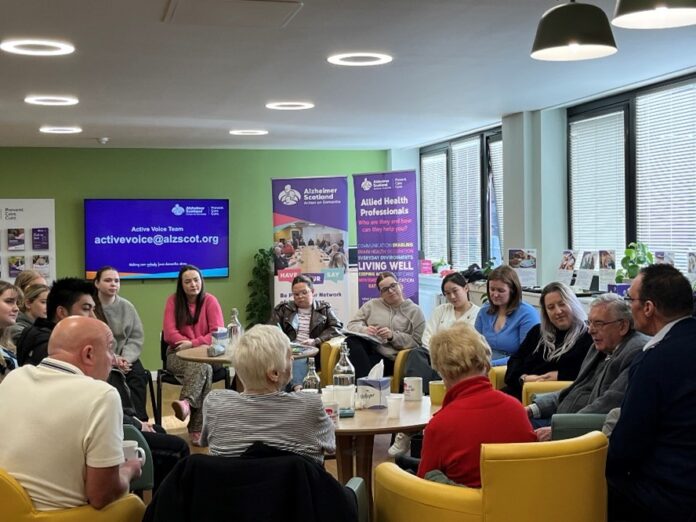Hi, I am a fourth-year occupational therapy student at Queen Margaret University, and I have the privilege to complete my final placement with Alzheimer Scotland working with both the Scottish Dementia Working Group and National Dementia Carers Action Network.
When I first learned that I would be doing this placement, I felt a mix of curiosity and excitement about what this experience would involve. What would my role be? How might it differ from my previous hospital-based placements? However, my day spent facilitating a student Allied Health Professional day with Alzheimer Scotland and the voices of lived experience truly opened my eyes to the incredible value and learning opportunity of this placement, and I wanted to share the success of this day and the importance of involving future speech and language therapy students in hearing from members Scottish Dementia Working Group (SDWG) and the National Dementia Carers Action Network (NDCAN).

The day began with a warm welcome and an inspiring presentation from a member of the Scottish Dementia Working Group, Margaret McCallion, who spoke with great confidence and shared her dementia journey, as well as the incredible work she has done for SDWG and her involvement with Alzheimer Europe! Following this, a member of the National Dementia Carers Action Network, Frank O’Hagan shared his moving experience of receiving support from allied health professionals and emphasised the importance we have in praising carers achievement no matter how big or small. He spoke about being a carer has its challenges and hard days and AHPs have a privileged job to “Keep us feeling more positive about what we are doing, and providing tips of things we can do better”

The first-year speech and language therapy students then participated in breakout room discussions, each facilitated by members of NDCAN and SDWG. These small-group conversations created a space for members to share a deeper insight into their personal experiences both with living and caring for someone with dementia. These conversations drew upon the various challenges they have faced and the positive feedback of support from allied health professionals.
The speech and language therapy students had the chance to ask questions, making it a truly enriching and interactive learning experience. This was especially valuable, as many of the carers brought firsthand knowledge of the support they had received from speech and language therapy, which was hopefully motivating to the students.
One thing that stood out to me, at this stage in their undergraduate programme, was that the students shared they only thought their role as a speech and language therapist involved swallowing assessments or recommending food and drink consistencies when working with people living with dementia, and there was less understanding of their role in communication. We hope we changed this perception. The carers further discussed the value and appreciation of the communication support, such as communication aids, they have received from speech and language therapy, which was really effective to hear.
There are many challenges people face accessing allied health professionals, a key one being the lack of awareness of the role we play in supporting people with dementia and their families and carers. In addition, it can be unclear where to go to access available treatment and support from allied health professionals. So how can we address these challenges? I feel a keyway to do this is to continue to raise awareness of the AHP role and involve students in hearing and understanding the voices of lived experience and how they value our role.
This day really highlighted the importance of educating future allied health professional students on the value of hearing from people with lived experience, which is something that cannot be gained from textbooks. Everyone has a story, and hearing everyone’s story is vital. Moreover, visits like these create amazing opportunities for allied health professional students to connect with the real-world aspects of professional practice. This valuable exposure hopefully broadens their understanding and also highlights the key role that Allied Health Professionals, including Speech and Language Therapists, play in supporting individuals with dementia, a contribution that often doesn’t get the recognition it deserves. Hopefully this is a learning experience future allied health professional students can have under their belt when going into future placements and practice.
We asked the speech and language therapy students, “During your visit to Alzheimer Scotland today, what was important to you?” and to top the success of the day off, we received some lovely feedback…
“Fantastic session! Very engaging and informative and lovely to learn everyone’s experiences with dementia”
“It was great to learn about the ways carers can be involved in the care and how appreciated the SLT profession is by both people living with dementia and their carers. A very welcoming environment”
“I learnt so much about the importance of the individual and the care and strength of carers, today was so informative and truly fantastic”
“Days like these inspire future professionals to advocate for change and ensure people living with dementia receive the best support possible!”
Thank you for reading my blog!
Contributor
Hannah Moore Final Year Occupational Therapy Student from Queen Margaret University


